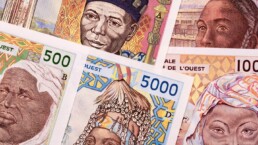The Eco is supposed to boost economic development in the West African region and improve cross border trade.
Twenty years ago, in the capital city of Ghana, Accra, six leaders from the West African states declared their intentions of proceeding towards a monetary union among the non-CFA franc countries in the region. As a first step, the monetary union was to spread towards all states in the ECOWAS) region by 2004. The union was and is still intended to reduce central bank financing of budget deficits to 10%. A strong declaration from the member states was that, a strong political commitment such as national policies would facilitate the regional monetary integration process.
The Eco is the proposed name for the single or common currency that the West African Monetary Zone (WAMZ) plans to introduce in the framework of the ECOWAS. The single currency will further be adopted by both WAMZ and West African Economic and Monetary Union (UEMOA) across the ECOWAS states.
Under the proposed common currency, the Eco will remain pegged to the Euro. Although the African states will not keep half of their reserves in the French Treasury and a French representative will no longer be needed when it comes to the currency union’s board, one has to consider the changes for states that are former French colonies, with the exception of Guinea Bissau, but who are also part of UEMOA.
For the UEMOA countries, introducing and adopting the Eco would also mean the end of the CFA franc. The changes imply the modification of several CFA franc-linked financial agreements that countries in UEMOA have in place with France.
Challenges & Benefits
Advocates of the single currency believe that, the existence of different exchange rate regimes in the region impedes trade. This is due to high transaction costs particularly from fees in currency conversion and hedging costs to cover exchange rate risk. It is also worth noting the challenges in the implementation process.
With the African Continental Free Trade Area (AfCFTA) agreement set to eliminate tariffs on goods and services, the adoption of a single currency, if successful, will facilitate trade, lower transaction costs and facilitate payments among ECOWAS countries.
If implemented, countries across the region will be able to move and spend money across different countries without any concerns about exchange rate costs. To begin with, exchange rates in the region are relatively volatile. A case for a monetary union or integration will help address the issue of multiple currencies and exchange rate fluctuations that affect intra-regional trade, thus strengthening the need for the adoption of a single currency
Furthermore, should the single currency be properly implemented, it is assumed to have a huge potential that allows each country to specialize in production. This will further allow a smooth exchange of goods between the member-states to be produced more efficiently and allowing for lower transactional costs. It is also very important to recognize that economic gains from a common currency are not mutually exclusive to infrastructure developments, more especially that one of the sought after benefits from the Eco is intraregional trade. Despite these possible benefits, proponents of the integration, remain worried about the lack of integration (policies among member countries in the region).
It is generally assumed that having a single currency is more likely to work if all countries are economically aligned as to avoid future economic segregation which has been seen in the case of the European Union.
The withdrawal of the United Kingdom from the European Union (EU), was largely been driven by a need of independence in terms of trade, agriculture, tariffs, immigration and amongst other things. The same concerns can be said about Nigeria, as being the largest economy in the region who can potentially dominate monetary policy and stall the benefits that are projected from this union.
Some might argue that economic alignment might not necessarily be a pre-requisite for the adoption of a single currency, as in the case of the EU where you can find that some countries have received support from Germany and France, which is a clear case of some countries being contributors and beneficiaries in the union. The same argument or concerns can thus be extended in analyzing countries who can potentially be contributors and beneficiaries in the ECOWAS region. For example, does having a larger GDP than other states imply that you might be the one pouring financial support should union not bring about the expected benefits? If we look at the Guinean economy, it has a GDP of around $7 billion which is rather less than that of Nigeria’s 13th largest state which has a GDP of around $8.7 billion which could make a sensible uniform policy somewhat challenging to achieve.
There are ten convergence criteria that each country would be required to meet for the Eco to be implemented. These major requirements have been set out by the West African Monetary Institute.
Up to the 2011 fiscal year, only Ghana has been able to meet all the primary criteria in any single fiscal year. Critics of this monetary integration would signal this as an indication of a weak implementation process. Furthermore, a state like Nigeria that is not only known for having a history of high inflation but also oil dependent economy that is sensitive to external shocks represents over 70% of Ecowas’ wealth. This imbalance would surely exacerbate the significant structural differences between the 15 states inside the proposed economic union.
Can it work?
For starters, just five countries out of the fifteen states in the region currently meet the single currency’s criteria of a budget deficit of no more than 4%, an inflation rate that is not higher than 5% and debts worth less than 70% of GDP. This seems like a strict convergence criteria for joining the single currency which has proved to be a major challenge to the introduction of the currency and almost seems unlikely to be met by most countries, more especially this year.
While the objective of this monetary union is quite clear, it should be noted that an adoption of a single currency alone will not address the serious domestic problems that the member-states are currently facing. Therefore, instead of trying to meet a short deadline for monetary union, member states should now, more than ever, invest their energies in reinforcing convergence on low inflation, sustainable fiscal policies and structural policies that will foster long term growth.
If countries in West Africa can boost intra-regional trade, increase foreign investment and job creation, this will undoubtedly enable the achievement of the convergence criteria mentioned above.
Much criticism stems from the fact that if goods in the region cannot move freely, how can a single currency adoption succeed? It is for this reason that the establishment of Trade Agreements such as the AfCFTA will foster the goods and services movement amongst African states with ease.
The Eco will clearly not be the sole solution for West Africa’s mounting problems, but there is hope regarding the region’s success in adopting and implementing their new single currency. The hope also stems from the fact that the currency can potentially address the region’s monetary problems such as the difficulty in converting some of its currencies and the lack of independence of central banks.
The year 2020 brings so much hope to the development of the Africa continent. Not only are we witnessing the adoption of a common currency, but major developments such as the AfCFTA and not forgetting the proposed formation of a Cocoa Cartel by two Cocoa giants, Ghana and Ivory Coast, certainly gives us an indication that Africa is certainly rising.
Given that a law on the reform of the Eco only passes to the French parliament until the end of September 2020, the agreement to adopt the Eco does not risk doing this before October 2020. Currently, the implementation of the Eco could be delayed by 5 years due to the impact of the Coronavirus pandemic.
The views expressed in this article are those of the author and do not necessarily reflect the views of Future Africa Forum. Future Africa Forum is a pan-African policy think-tank and policy advisory consultancy headquartered in Nairobi, Kenya.


